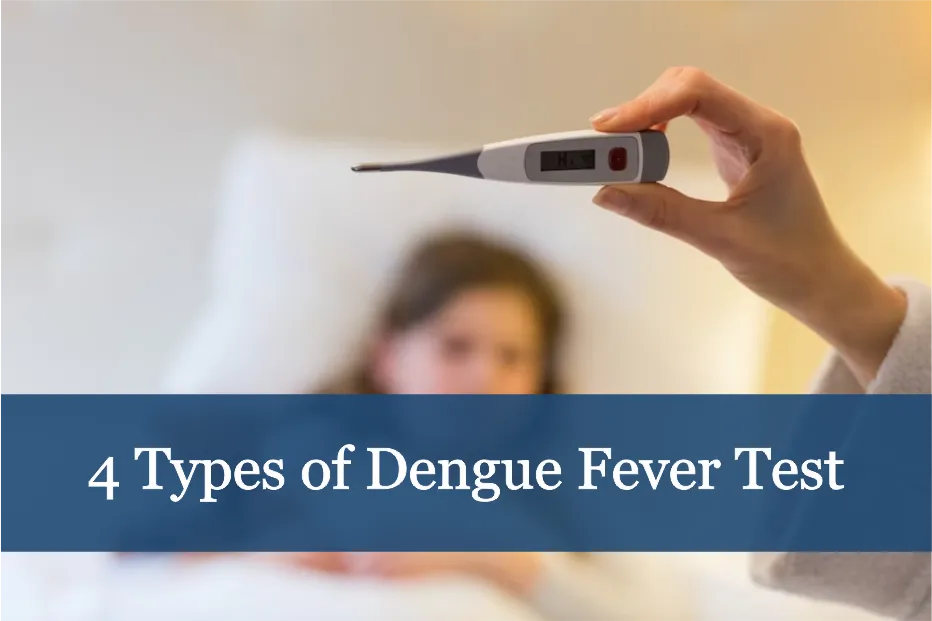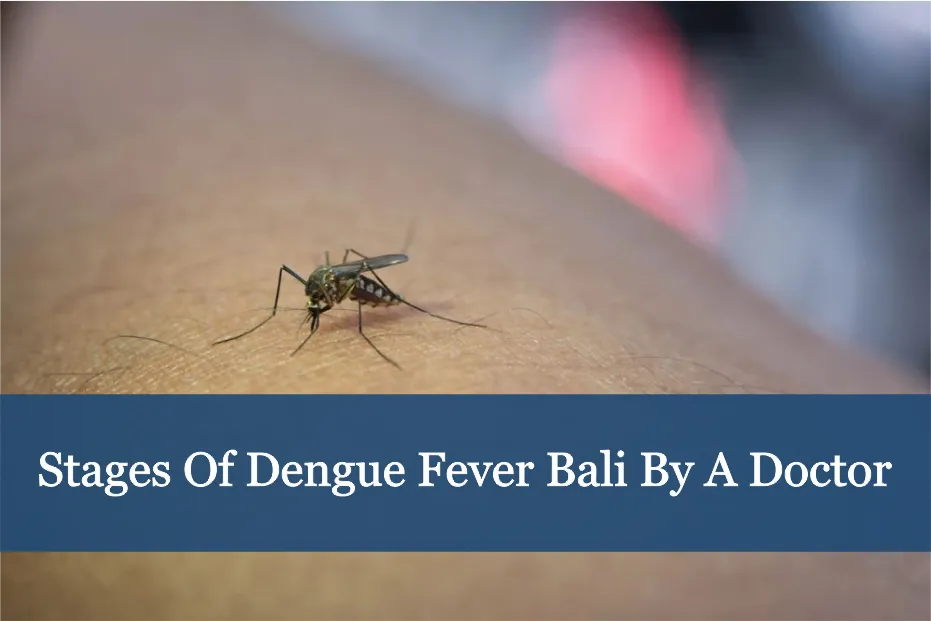Dengue fever Bali is an effort to handle and examine someone who has symptoms of dengue fever. This is a hazardous disease for humans, caused by a virus carried by the Aedes Aegypti mosquito.
Dengue fever is a dangerous disease; where this disease has early symptoms, where the patient has a fever with an unstable body temperature or also called biphasic fever, which is generally felt for about 2 to 6 days. When a person is already suffering from early symptoms, it is highly recommended to do a dengue fever Bali test to confirm the body’s condition.
Areas susceptible to dengue fever are densely populated residential areas and rarely cleaned. This will make the growth of mosquito larvae the development of these dangerous mosquitoes is growing.

4 Types of Dengue Fever Test
The dengue fever test has its type, distinguished based on the sample taken and the different levels of symptoms for each patient. Several types of dengue fever tests are,
- Complete blood test
- NS1 test
- IgM and IgG ELISA test
- Hemagglutination Inhibition Assay
Before performing the dengue fever Bali , the doctor will ask related questions to know more about the type of test to be carried out. The questions are in the form of symptoms that are felt and a description of the location of the patient’s residence. To better understand these types of tests, the following is an in-depth discussion,
1. Complete blood test
This test requires a complete blood component, including platelets, hematocrit, and plasma. So that in the examination, the patient’s blood will be taken as a sample to determine the dengue fever Bali results. In this test, a person will be said to be positive for dengue fever if they have a platelet level that reaches 100,000 microliters which will be explained from the results of other examinations.
2. Non-Structural Blood Test-1 (NS1)
This type of test is carried out to detect patients who feel early symptoms, where patients feel symptoms from the first 1 to 3 days. As the name suggests, NS1 is a type of protein contained in the virus, where when this disease attacks someone, the virus will release protein compounds that are spread into the blood, so using this type of test will allow doctors to read the protein content in the blood. A person who has been attacked by dengue fever is said to be positive if there is already protein content in the blood, after which the examination will continue with the next stage.
3. IgM and IgG ELISA test
This examination is in the form of types of antibodies in the body, namely Immunoglobulin (IgG) and Immunoglobulin M (IgM), this type of antibody will automatically be formed when a person is exposed to dengue fever, in contrast to NS1, these antibodies do not automatically form and flow into the blood. Hence, the test is suitable for patients who have felt symptoms on the 4th or 5th day. A person can be said to be positive for dengue fever if one of these IgM and IgG has been detected in the blood.
4. Hemagglutination Inhibition Assay
This type of dengue fever Bali can be done at a later stage after IgM and IgG antibodies are detected in the body, but sometimes this test can also be done in parallel to detect the presence of one of these antibodies in the blood. This test will be able to see the development of already chronic antibodies and must be carried out further examinations.
Some of the tests above are recommended to be carried out if a person has experienced symptoms of an unstable fever. Other than that, other symptoms that the patient will feel are feeling pain in the body, the appearance of red spots on the body, and even the patient will experience bleeding from the skin to digestion.

Stages of dengue fever Bali by a doctor
In the examination of the dengue fever Bali , several things will be done by the doctor; these stages begin by providing an understanding regarding the calm of dengue fever. In more detail, the settings of the test are as follows,
- In the early stages, the doctor will ask questions related to the symptoms felt by the patient, besides that the doctor also needs to know the environment where he lives and travels that have been done, this needs to be done so that the doctor can understand the symptoms and the environment that causes dengue fever.
- Suppose the doctor finds symptoms related to dengue fever. In that case, the doctor will perform the next stage with an initial examination, such as the level of fever and the patient’s current body condition.
- After the doctor’s initial examination results indicate that the patient has symptoms of dengue fever, the doctor will immediately recommend that the patient check the blood through various types of tests that we have discussed previously.
- Blood tests will be carried out by injecting a needle to take blood samples from doctors and experts, where they need the patient’s blood as a follow-up examination sample.
- After the blood is successfully drawn, the doctor will take the sample for further examination, and the patient is asked to wait for the investigation results.
Experts in the laboratory will carry out these stages. During the blood examination, the patient will be advised to reduce activity and given medicine to relieve fever and pain temporarily. If there is a substantial positive change, the patient will be reported to undergo hospitalization in a hospital so that more controllable during the examination.

Spread of dengue fever in big cities
Various things can overcome the spread of dengue fever, and one of the leading causes is the lack of environmental hygiene, causing the development of dangerous mosquitoes.
Population development in big cities such as Jakarta and Bali, where the city is densely populated. In addition to population density, dengue fever also dramatically affects the tropics, which have high levels of rainfall. Dengue fever in Bali is also one thing that must be considered. In contrast, a city that has famous tourist attractions will be hazardous if it does not have serious supervision of its environment.
Symptoms of dengue fever in Bali are an essential thing to pay attention to; when someone is bitten in Bali, it will be easy to spread if you see the high population density and crowded areas visited by tourists in Bali.
A person who has tested positive for dengue fever has a recovery period of 48 to 72 hours after a critical period, during which the patient will experience fluid discharge from blood vessels exposed to the virus, then re-enter when the dengue virus infection has started to subside.
Frequently Asked Question about Dengue Fever Bali
What is dengue fever in Bali?
Dengue fever in Bali is a viral disease caused by the dengue virus that is transmitted by mosquitoes in Bali.
How common is dengue fever in Bali?
Dengue fever is prevalent in Bali, especially during the rainy season when the mosquito population increases.
What are the symptoms of dengue fever?
The symptoms of dengue fever include high fever, severe headache, joint and muscle pain, rash, and fatigue.
How is dengue fever diagnosed in Bali?
Dengue fever is diagnosed through a blood test that detects the presence of the virus.
How can I prevent dengue fever in Bali?
To prevent dengue fever in Bali, it is recommended to use mosquito repellent, wear protective clothing, and avoid areas with standing water.
Is there a vaccine for dengue fever in Bali?
There is a vaccine for dengue fever, but it is not widely available in Bali. Consult with a healthcare professional before traveling to Bali.
How is dengue fever treated in Bali?
There is no specific treatment for dengue fever. Treatment focuses on managing symptoms, such as fever and pain relief, and staying hydrated.
Can dengue fever be dangerous?
Dengue fever can be dangerous, especially in severe cases where it can lead to dengue hemorrhagic fever or dengue shock syndrome. Seek medical attention if symptoms worsen or persist.
Is dengue fever contagious in Bali?
Dengue fever is not contagious, but it can be transmitted through the bite of an infected mosquito.
Can I still travel to Bali if there is an outbreak of dengue fever?
Travelers can still travel to Bali during a dengue fever outbreak, but it is essential to take necessary precautions, such as wearing protective clothing, using mosquito repellent, and avoiding areas with standing water.




